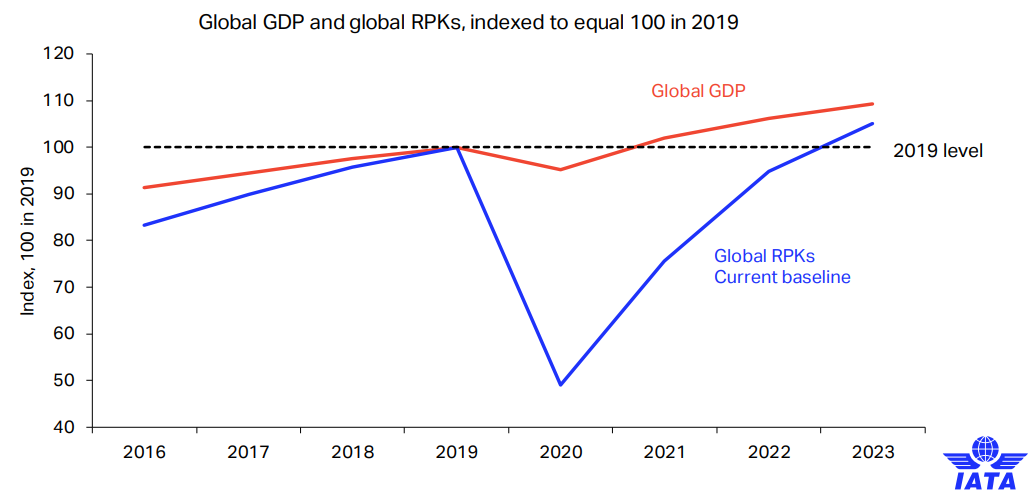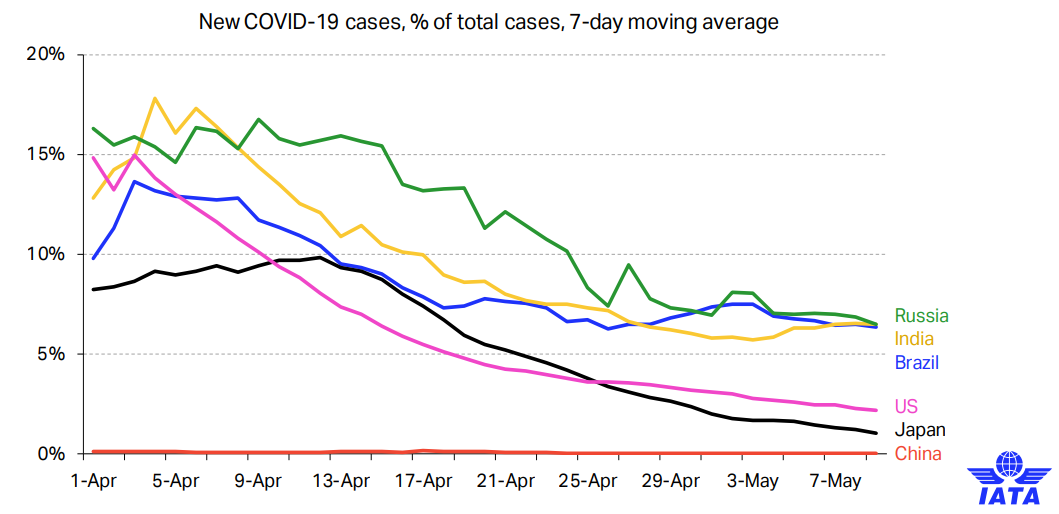In the early stages of the pandemic's spread some had suggested that a recovery could see passenger numbers climb quickly over the remainder of the year, but as the complexity of the crisis has deepened and the virus has pretty much enveloped the globe it is now clear that there are no swift solutions to delivering a sustainable air transport industry at the current time.
Working in partnership with Tourism Economics, IATA says that even if domestic markets open during the third quarter and are followed by a much slower phased opening of international markets, global passenger demand (measured in revenue passenger kilometres, RPKs) next year (2021) will still be around three quarters the level seen in 2019, down -24%. In fact, in its baseline scenario IATA and Tourism Economics don't expect 2019 air travel levels to be exceeded until 2023.
IATA predicts that as international markets open and economies recover, there will be further growth in air travel from the 2020 low point. But even by 2025 it does not expect global RPKs to reach the level predicted in its previous future forecasts and suggests they will be around 10% lower than it had expected.
CHART - IATA predicts that air travel may recover more slowly than most of economy and global RPKs will not recover to 2019 levels until 2023, two years behind GDP recovery Source: IATA / Tourism Economics, Air Passenger Forecasts, Apr-2020
Source: IATA / Tourism Economics, Air Passenger Forecasts, Apr-2020
There is a more pessimistic scenario based on a slower opening of economies and relaxation of travel restrictions, with lockdowns extending into the third quarter, possibly due to a second wave of the virus that would further delay the recovery of air travel. In this case, global RPKs in 2021 could be a third (34%) lower than 2019 levels.
While major stimulus from governments combined with liquidity injections by central banks will boost the economic recovery once the pandemic is under control, rebuilding passenger confidence will take longer. And even then, warns IATA's director general and CEO Alexandre de Juniac, "individual and corporate travellers are likely to carefully manage travel spend and stay closer to home".
Travel restrictions mean that when the recovery begins, it will be led by domestic travel. An IATA survey of recent air travellers conducted in Apr-2020 found that 58% are somewhat or very likely to restrict their initial travel to domestic journeys. IATA predicts domestic RPKs will recover to 2019 levels by 2022, while it will not be until 2024 that international RPKs return to that same benchmark.
CHART - Solving health challenge is critical for international travel and until a vaccine arrives opening borders to travel requires a fall in Covid-19 risk Source: IATA Economics using data from the World Health Organization (WHO)
Source: IATA Economics using data from the World Health Organization (WHO)
IATA is strongly urging governments to find alternatives to maintaining or introducing arrival quarantine measures as part of post-pandemic travel restrictions. These, it says, "would further damage confidence in air travel". It instead supports "a risk-based layered approach of globally harmonised biosecurity measures" which it describes as being "critical for the restart" of the industry.
IATA's Apr-2020 survey of recent air travellers showed that four in five (86%) travellers were somewhat or very concerned about being quarantined while traveling, and more than two thirds (69%) of recent travellers would not consider travelling if it involved a 14-day quarantine period.
"Even in the best of circumstances this crisis will cost many jobs and rob the economy of years of aviation-stimulated growth. To protect aviation's ability to be a catalyst for the economic recovery, we must not make that prognosis worse by making travel impracticable with quarantine measures," says Mr de Juniac.
IATA desires a solution for safe travel that addresses the challenges of giving passengers confidence to travel safely and without undue hassle, while affording governments confidence that they are protected from importing the virus. "The mutual recognition of agreed measures is critical for the resumption of international travel," says IATA.